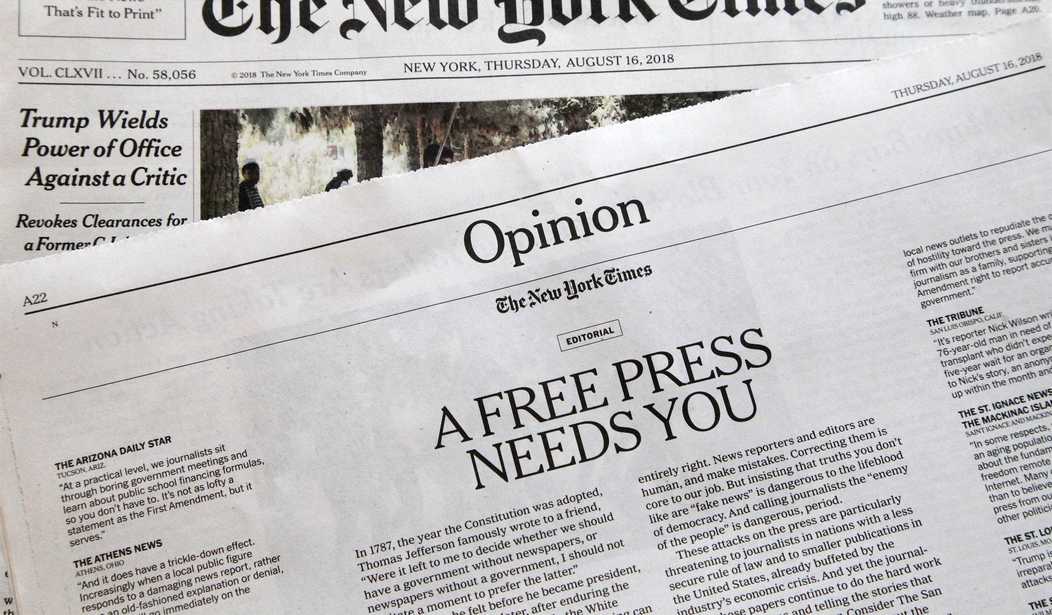Is it time to ask if the Old Gray Lady is turning senile?
Last year The New York Times was in a fluster when its highly touted, wildly publicised new look at the history of this country The 1619 Project came under fire when historical fact-checking exposed it as a sham. The paper spent time and energy pushing the project and getting it instituted into school curriculums, but did little work in actually vetting the facts contained therein. Numerous historians have challenged the piece, with one describing it as ‘’Anti-historical’’.
Despite efforts to defend the content it has become an ongoing embarrassment for The Times, and now the paper has another major story that is falling apart under scrutiny. In 2018 there was praise rising up for a podcast series entitled ‘’Caliphate’’. More than 2 years later, information has emerged that shows the basis for the entire series has been found to be fabricated. Now, following internal investigations, The Times disavows much of the podcast, issued corrections on the published stories prior to the broadcast, and have reassigned the reporter, Rukmini Callimachi, who was delivering the content.
Caliphate covered the story of Shehroze Chaudhry, a Canadian who became radicalized into the ISIS organization. The series outlined his move to Syria, and covered numerous exploits and activities as an executioner for the outfit – including details of executions he carried out – before he escaped back to his homeland. Problems became exposed when Canadian authorities investigated the discrepancies in Chaudry’s accounts, leading to charges being brought up over his perpetrating a terrorism hoax.
Chaudhry was little more than a Toronto resident who wanted to dramatize his own import. The series won international acclaim as well as a number of journalism accolades, including a Peabody Award. The Times has returned the trophy following the revelation of fraudulent content. What has been exposed beyond the focus of their story being based on unattributed information is an institutional willingness at The Times to overlook obvious problems and numerous instances of people alerting the paper to problems with both the content and the process.
As far back as 2014 there were voices coming forward to question some of the foundational facts with Callimachi’s reporting. A story about a Syrian journalist allegedly held hostage, along with three American citizens, has since been given a major correction. ‘’The Times learned that Mr. Aljoud had given inconsistent accounts of key elements of the episode to Times journalists,’’ goes a portion of the mea culpa.
The Washington Post noted that a Syrian journalist has come forward since the retractions to state how he had been expressing his problems with content prior to the publication of the article.
I sent Rukmini corrections before the story was published. She ignored them. https://t.co/AaFAI1jNXJ
— Karam Shoumali (@KaramShoumali) December 18, 2020
With all of the revelations coming forward Callimachi has been reassigned, taken off of any stories involving covering international terrorism. This is about as bad as it can get short of firing, as Callimachi’s entire career is based on her reporting on this very subject matter. While this has been a blow to her career The Times has said it was more than her errors that led to this catastrophe.
“This failing isn’t about any one reporter. I think this was an institutional failing,” said Times Executive Editor Dean Baquet. (Many of these problems were addressed by Baquet on a Times podcast.) At WaPo, Erick Wemple explains that a meeting with editors and under-staff over this issue turned contentious, as former colleagues of Callimachi detailed how numerous times they came to management with concerns over her work only to be met with more than just executive apathy.
Correspondent C.J. Shivers, who had worked with Callimachi, detailed how the problems arose. “Warnings were not just dead letters. They became a basis to impugn people personally and professionally.” Shivers cited these problems directly as he described the attitude of the Times’ Middle East correspondents as being like ‘’Losing faith in a church.’’ This underscores an institutional issue festering at The Times. The editorial staff appears willing to rest upon fabulism and corrupted journalism, all in the name of getting out a story it wants told, or pushing a narrative it favors.
What is revealing is that the paper conducted an investigation, looking into claims, verifying sources, and vetting facts — AFTER it has printed stories and run a lengthy media series. They seem only willing to engage in basic journalistic practice after the fact, and once problems arose. That this is not the first time it has occurred at The New York Times over the past few years displays the corporate mentality that is driving the news organization.














Join the conversation as a VIP Member